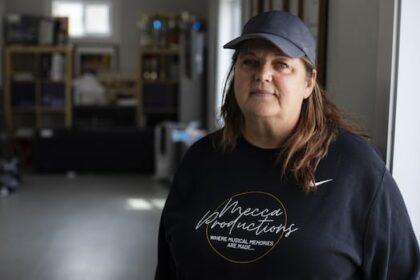PEIThe inquest into the death of Brandi Clarke got underway in Charlottetown on Tuesday with the testimony of the psychiatrist who primarily treated her from 2019 until her death in 2023.P.E.I. woman died of diabetic ketoacidosis in 2023 while living in a complex run by CMHANicola MacLeod · CBC News · Posted: Nov 25, 2025 5:41 PM EST | Last Updated: 5 hours agoListen to this articleEstimated 5 minutesThe audio version of this article is generated by text-to-speech, a technology based on artificial intelligence.P.E.I. woman who died in transitional housing facility had history of diabetic, mental health hospitalizations, inquest hearsBrandi Clarke was 25 years old when she died in 2023 from complications of her Type 1 diabetes. The jury heard from her psychiatrist on the opening day of the inquest into her death. CBC’s Nicola MacLeod was there.The inquest into the death of Brandi Clarke got underway in Charlottetown on Tuesday with the testimony of the psychiatrist who primarily treated her from 2019 until her death.The 25-year-old died of diabetic ketoacidosis on March 19, 2023 while she was living in a transitional housing complex in Charlottetown run by the P.E.I. Division of the Canadian Mental Health Association (CMHA).The six jurors selected in the morning heard Clarke was born in the Magdalene Islands and then moved to P.E.I. as a child. She also spent time in Alberta in her youth and as an adult. She had been hospitalized in both P.E.I. and Alberta for reasons stemming from her Type 1 diabetes and ongoing mental health struggles. She moved back to P.E.I. to live with her mother in 2018.Over time, Clarke had been assessed and treated for post-traumatic stress disorder, substance use disorder, borderline personality disorder and bipolar disorder — but P.E.I. psychiatrist Dr. Robert Jay told the jury his diagnosis for Clarke’s psychosis was rooted in schizophrenia. “It often was difficult with Brandi. She was very articulate, very intelligent. In most cases she would deny having any active psychotic symptoms,” Jay said Tuesday.“She was a lovely young woman. It’s a shame.”Before her death at the age of 25, Brandi Clarke had been hospitalized in both P.E.I. and Alberta for reasons stemming from her Type 1 diabetes and ongoing mental health struggles. (Submitted by Heidi Clarke)Jay primarily treated Clarke as an outpatient, meaning she was not in hospital at the time, and she would see him through scheduled appointments. But jurors heard Jay did have Clarke sent for involuntary psychiatric assessments when he felt her psychiatric state had slipped to a point where that was necessary. That happened twice in March and April of 2022.“When she was not doing well psychiatrically, she was much less likely to do well with her diabetes,” the doctor said.“Every time I met with her, I stressed the importance of her taking care of her diabetes.”Clarke prescribed anti-psychoticsThe inquest heard all of the anti-psychotic drugs Clarke was prescribed were voluntary, but she had a history of not taking her oral medications, and of poor diabetes management. For about the last year of her life, she was on a combination of longer-lasting anti-psychotics that were injected every few weeks, as well as oral medications.Clarke had lived in a few assisted-living environments in the last years of her life, including privately-operated community care facilities. In December 2021, she moved to her first CMHA-run facility: Notre Dame Place in Summerside.In September 2022, she moved to the organization’s transitional housing facility in Charlottetown. It was there that staff would find Clarke dead in her apartment six months later.The supported housing environment has 24-hour staff who are there to assist the residents on their journey to getting their own independent living arrangements. The inquest heard Clarke started in a unit where she shared common areas with other residents, but then moved to her own apartment on the second floor.This is the CMHA housing complex where Brandi Clarke lived leading up to her death in March 2023. (Kerry Campbell/CBC)On the day of her death, staff noted Clarke had not been seen for her usual afternoon smoke break. It was then that they entered the unit and found her laying on her bed. The paramedics who arrived at the scene noted she was “obviously dead.”Clarke’s cause of death was diabetic ketoacidosis, a metabolic state where one’s blood turns acidic due to a lack of insulin and things in the body start to go awry: you lose blood pressure control, organs don’t function well and you can’t fight infections.The inquest heard Clarke had been hospitalized for this before and the only cure is the aggressive re-administering of insulin.“If it goes untreated, you die,” retired P.E.I. nephrologist Dr. Bruce Jones told the jurors.Transitional housing not a health-care facility, lawyer saysClarke’s mother Heidi Clarke had previously told CBC News she inquired at her daughter’s intake appointment if staff had the education and ability to remind Brandi to check her sugars and supervise her in administering insulin.She said she originally understood that this was something CMHA staff could do, but then after Brandi’s death, she was told it was not.This is Brandi Clarke’s blood glucose monitor, which shows it was used to monitor her need for insulin only twice in the months before she died. (Kerry Campbell/CBC)Heidi Clarke, Health P.E.I. and the CMHA have all been granted standing during the inquest. That means they can make statements and ask the witnesses questions after the original probe by the Crown Attorney.“The CMHA does not operate health-care facilities,” legal counsel Gary Demeulenaere said during opening statements, noting that the residents of those programs are autonomous. Current and former staff of the organization are expected to begin testifying when the inquest resumes on Wednesday morning. ABOUT THE AUTHORNicola is a reporter and producer for CBC News in Prince Edward Island. She regularly covers the criminal justice system and also hosted the CBC podcast Good Question P.E.I. She grew up on the Island and is a graduate of St. Thomas University’s journalism program. Got a story? Email nicola.macleod@cbc.caNicola MacLeod on X
Brandi Clarkes diabetic care often fell alongside psychiatric health, inquest hears











